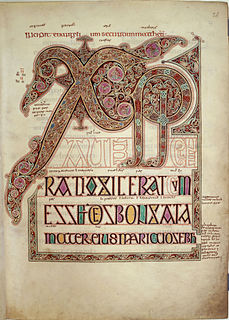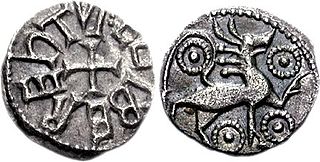Beornhæth was an Anglo-Saxon nobleman in Northumbria in the reign of King Ecgfrith (ruled 671–685). He was the first of his family to come to notice.

The Anglo-Saxons were a cultural group who inhabited Great Britain from the 5th century, and the direct ancestors of the majority of the modern British people. They comprise people from Germanic tribes who migrated to the island from continental Europe, their descendants, and indigenous British groups who adopted many aspects of Anglo-Saxon culture and language; the cultural foundations laid by the Anglo-Saxons are the foundation of the modern English legal system and of many aspects of English society; the modern English language owes over half its words – including the most common words of everyday speech – to the language of the Anglo-Saxons. Historically, the Anglo-Saxon period denotes the period in Britain between about 450 and 1066, after their initial settlement and up until the Norman conquest. The early Anglo-Saxon period includes the creation of an English nation, with many of the aspects that survive today, including regional government of shires and hundreds. During this period, Christianity was established and there was a flowering of literature and language. Charters and law were also established. The term Anglo-Saxon is popularly used for the language that was spoken and written by the Anglo-Saxons in England and eastern Scotland between at least the mid-5th century and the mid-12th century. In scholarly use, it is more commonly called Old English.
Ecgfrith was the King of Deira from 664 until 670, and then King of Northumbria from 670 until his death in 685. He ruled over Northumbria when it was at the height of its power, but his reign ended with a disastrous defeat at the Battle of Nechtansmere in which he lost his life.
Eddius's Life of Saint Wilfrid , recounting Ecgfrith's campaign against the Picts in 671 or 672, states that he was accompanied by the "sub-king" Beornhæth. It is presumed that Beornhæth ruled a part of northern Bernicia, perhaps in modern Lothian where there was a major Northumbrian fortress at Dunbar. [1] In 8th century Northumbria, a large number of noble families claimed descent from the legendary King Ida, or from the Deiran royal house, but it is not known whether Beornhæth claimed descent from Ida. [2]

Wilfrid was an English bishop and saint. Born a Northumbrian noble, he entered religious life as a teenager and studied at Lindisfarne, at Canterbury, in Gaul, and at Rome; he returned to Northumbria in about 660, and became the abbot of a newly founded monastery at Ripon. In 664 Wilfrid acted as spokesman for the Roman position at the Synod of Whitby, and became famous for his speech advocating that the Roman method for calculating the date of Easter should be adopted. His success prompted the king's son, Alhfrith, to appoint him Bishop of Northumbria. Wilfrid chose to be consecrated in Gaul because of the lack of what he considered to be validly consecrated bishops in England at that time. During Wilfrid's absence Alhfrith seems to have led an unsuccessful revolt against his father, Oswiu, leaving a question mark over Wilfrid's appointment as bishop. Before Wilfrid's return Oswiu had appointed Ceadda in his place, resulting in Wilfrid's retirement to Ripon for a few years following his arrival back in Northumbria.

The Picts were a confederation of peoples who lived in what is today eastern and northern Scotland during the Late Iron Age and Early Medieval periods. Where they lived and what their culture was like can be inferred from the geographical distribution of Brittonic place name elements and Pictish stones. The name Picts appears in written records from Late Antiquity to the 10th century, when they are thought to have merged with the Gaels. They lived to the north of the rivers Forth and Clyde, and spoke the Pictish language, which was closely related to the Celtic Brittonic language spoken by the Britons who lived to the south of them.
Bernicia was an Anglo-Saxon kingdom established by Anglian settlers of the 6th century in what is now southeastern Scotland and North East England.
Beornhæth's son Berhtred (died c. 698), also called Berht, commanded King Ecgfrith's punitive expedition to kingdom of Brega, in Ireland, in 684. Beorhtred's paternity is known from the notice of his death in the Irish annals, where he is called the son of Beornhæth. [3]

A punitive expedition is a military journey undertaken to punish a state or any group of persons outside the borders of the punishing state. It is usually undertaken in response to perceived disobedient or morally wrong behavior, either as revenge or to apply strong diplomatic pressure without a formal declaration of war. In the 19th century, punitive expeditions were used more commonly as pretexts for colonial adventures that resulted in annexations, regime changes or changes in policies of the affected state to favour one or more colonial powers.
The Kings of Brega were rulers of Brega, a petty kingdom north of Dublin in medieval Ireland.

Ireland is an island in the North Atlantic. It is separated from Great Britain to its east by the North Channel, the Irish Sea, and St George's Channel. Ireland is the second-largest island of the British Isles, the third-largest in Europe, and the twentieth-largest on Earth.
Historians presume that Berhtfrith, "a nobleman second in rank only to [King Osred]", [4] was a son of Berhtred. [5] Berhtfrith was largely responsible for the defeat of the would-be King Eadwulf, and the installation of Aldfrith's son Osred on the throne as child-king in 705. Berhtfrith appears to have achieved this by making peace between Osred's supporters, and those of Bishop Wilfrid. [6]
Osred was king of Northumbria from 705 until his death. He was the son of King Aldfrith of Northumbria. Aldfrith's only known wife was Cuthburh, but it is not known for certain whether Osred was her son. Osred did not directly succeed his father as Eadwulf seized the throne, but held it for only a few months.









